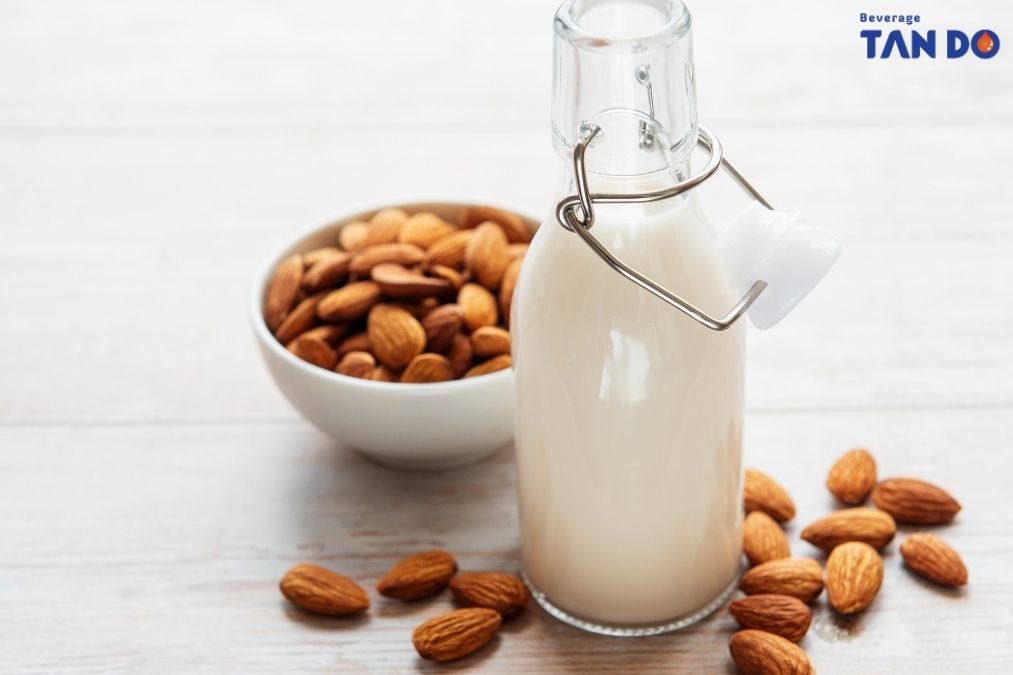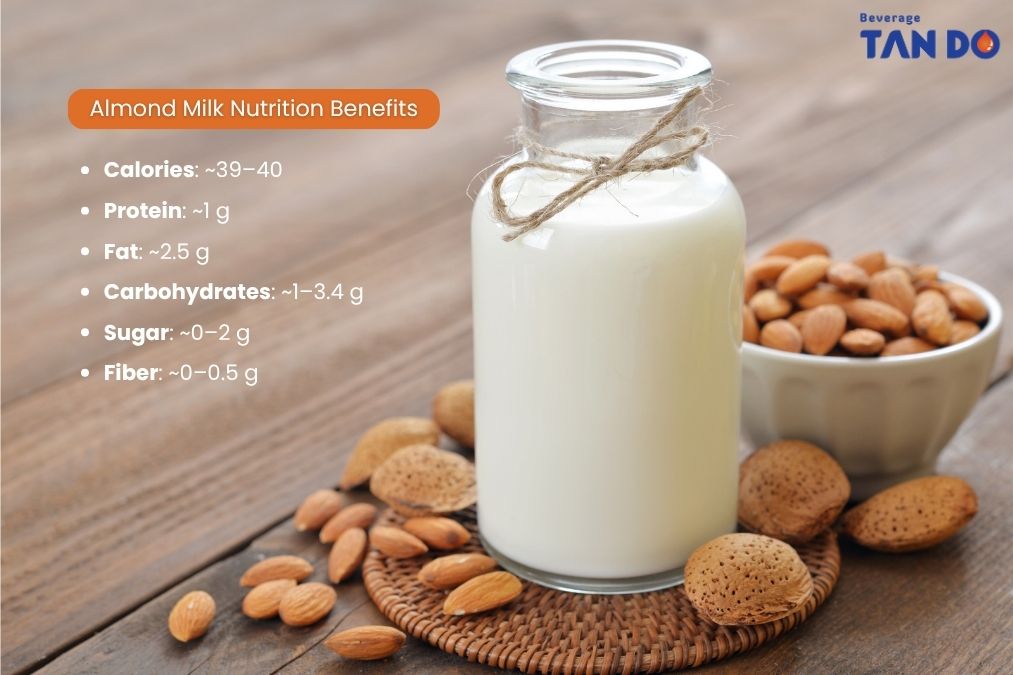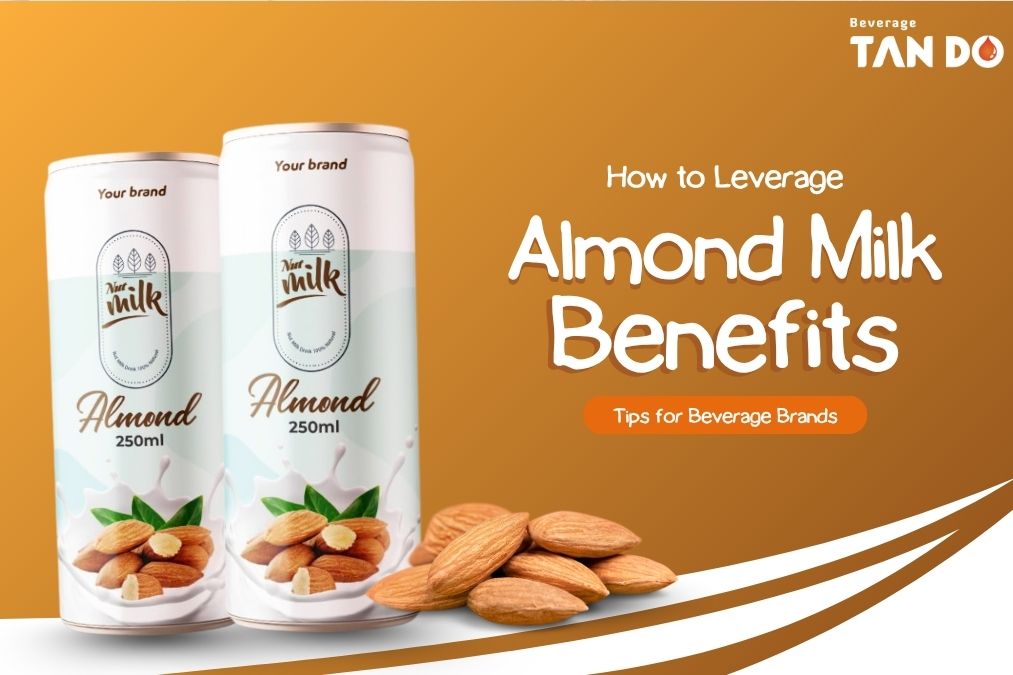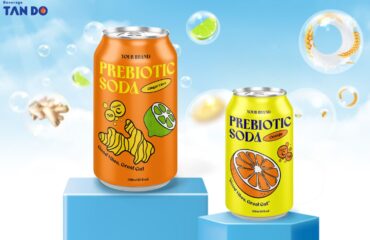Almond milk benefits have made this plant-based drink more than just a health trend — it’s now one of the most popular choices for those seeking something nutritious, light, and dairy-free. As more consumers embrace plant-based living, almond milk stands out for its smooth texture, gentle flavor, and impressive wellness perks.
In this blog, we’ll explore the top benefits of almond milk and how brands can turn this wholesome drink into the next big success in the plant-based market!
What Is Almond Milk?
Before we dive into the health benefits of almond milk, let’s look at what’s really inside a glass of almond milk — and how it stacks up nutritionally:
Almond milk starts with one simple ingredient: almonds. These nutrient-packed nuts come from almond trees that thrive in warm, sunny climates across the Middle East, South Asia, and now, California. It takes months of careful growing, watering, and harvesting to produce the high-quality almonds used in your favorite drinks.


To make almond milk, the almonds are blended with water and then gently strained to create a smooth, creamy liquid with a mild, nutty flavor. It’s naturally cholesterol-free, lactose-free, and low in saturated fat, which makes it a great choice for anyone avoiding dairy or simply looking for a lighter, heart-friendly alternative.
Almond Milk Nutrient Content
Commercial almond milk is typically low in protein and fiber but fortified to enhance its nutritional value. Most products add calcium, vitamin D, and sometimes vitamin B12 to better resemble the nutrient profile of dairy milk.
According to Healthline, a standard cup (240 ml) of unsweetened almond milk provides multiple nutrient benefits:
- Calories: ~39–40
- Protein: ~1 g
- Fat: ~2.5 g
- Carbohydrates: ~1–3.4 g
- Sugar: ~0–2 g
- Fiber: ~0–0.5 g


In short: its almond milk nutrition benefits depend largely on the formulation — how much almond is used and how effectively it’s fortified.
What Are The Benefits of Drinking Almond Milk?
Below are 8 key benefits for almond milk, and what they could mean for your product development:
1. Excellent Source of Vitamin E (Antioxidant Support)
One of the greatest almond milk benefits lies in its rich vitamin E content — a natural antioxidant that helps protect your cells from oxidative stress.
Typically, a single cup of almond milk can provide around 20–50% of your daily vitamin E needs. This vitamin helps fight inflammation, supports skin elasticity, and contributes to overall immune function.
Vitamin E is also known to protect the body from free radicals that accelerate aging and cellular damage. If you’re developing or marketing plant-based beverages, highlighting antioxidant properties adds a strong “functional wellness” edge to your product story.
2. Low in Calories — Especially When Unsweetened
If you’re keeping an eye on your calorie intake, almond milk is one of the most figure-friendly choices out there. Unsweetened almond milk typically contains just 30–40 calories per cup, compared to about 120 calories in whole cow’s milk.
Because it’s mostly made from water and almonds, you still enjoy that light, nutty flavor without the heaviness of dairy.
For beverage brands, offering almond milk benefits such as low-calorie and nutrient-rich can perfectly capture the attention of health-conscious consumers and the weight-management market.
3. Gentle on Blood Sugar Levels
Wondering “what does almond milk do to your body” if you’re watching sugar intake?
The answer: quite a bit. Unsweetened almond milk contains very few natural sugars or carbohydrates — usually just 1–2 grams per serving, according to WebMD. That means it has minimal impact on blood sugar levels, making it a smart choice for people with diabetes or anyone trying to maintain steady energy throughout the day.
For beverage brands, this is one of the key advantages of almond milk over regular milk — it fits perfectly into today’s low-sugar, low-carb, and low-glycemic lifestyle trends that health-conscious consumers are actively seeking.
4. Dairy-Free, Lactose-Free & Vegan
One of the most remarkable almond milk benefits is that it’s naturally dairy-free and lactose-free.
If you’re lactose-intolerant or allergic to dairy proteins, almond milk offers a smooth and easy-to-digest alternative that doesn’t compromise on taste. It’s also a go-to choice for vegans and flexitarians who want to cut back on animal products without giving up creamy beverages.
This inclusivity makes almond milk a must-have in today’s beverage portfolios — perfect for cafés, nutrition bars, or CPG brands looking to serve diverse consumers.
5. Strengthens Bones When Fortified
On its own, almond milk is low in calcium. But most commercial brands fortify their products with calcium, vitamin D, and vitamin B12 to make them nutritionally comparable to dairy milk.
According to Healthline, fortified almond milk benefits include providing up to 25% of your daily calcium needs per cup — a key factor for strong bones and muscle function. Research from the National Institutes of Health (NIH) also shows that calcium works best when paired with vitamin D, helping boost absorption and reduce the risk of osteoporosis over time.
For beverage brands, emphasizing fortified almond milk benefits is a smart strategy — especially for consumers who skip dairy but still want bone-health support from their daily drinks.
6. Heart-Healthy and Cholesterol-Free
Here’s one of the strongest benefits of drinking almond milk: it’s naturally free from cholesterol and saturated fat. Almond milk’s unsaturated fats may help improve lipid profiles and support cardiovascular health when included in a balanced diet.
A review published in the Journal of Nutrition also found that regular almond intake may help lower LDL (“bad”) cholesterol while increasing HDL (“good”) cholesterol — a combination that promotes better cardiovascular wellness.
For functional beverage brands, that’s a heart-smart story worth sharing — perfect for consumers who care about wellness, prevention, and making smarter daily choices.
7. Skin & Eye Benefits
Beyond its inner wellness benefits, almond milk also supports skin radiance and eye health. Its antioxidant content helps protect skin from UV exposure and oxidative stress, while some fortified almond milks include vitamin A — essential for maintaining good vision (Verywell Health).
For modern consumers, these “beauty-from-within” benefits make almond milk a lifestyle-friendly beverage that nourishes both inside and out.
8. Sustainable & Allergy-Conscious Choice
Finally, almond milk fits beautifully into today’s global sustainability and wellness trends. While almond cultivation does require significant water, research shows that producing almond milk generally results in far lower greenhouse gas emissions than dairy farming
For modern beverage brands, this blend of eco-friendly and body-friendly benefits makes almond milk a natural fit for consumers who care about both personal health and planetary wellbeing.


Potential Downsides & What to Watch Out For
Beside those almond milk benefits, here are the limitations and caveats — important knowledge for brand integrity and transparent marketing:
- Low Protein Content: Almond milk generally offers only ~1 g protein per cup, far less than cow’s milk (~8 g). If your beverage line emphasizes protein, almond milk alone may need supplementation (e.g. pea or soy protein blends).
- Allergy Risk: Almond milk is unsuitable for those with tree nut allergies. Brands must clearly label and consider allergen cross-contamination.
- Water Use & Sustainability Concerns: Almond cultivation, especially in regions like California, is water-intensive. Sustainability is a growing concern with large-scale almond milk production.
- Bioavailability Issues from Phytic Acid: Almonds contain phytic acid, which can reduce absorption of minerals like iron, zinc, and magnesium. This effect can carry over to almond milk forms.
- Not Suitable for Infants Under 12 Months: Due to low protein and missing nutrients, almond milk is not an adequate milk substitute for infants.
Tips for Beverage Brands: How to Leverage Almond Milk Benefits
When you want to bring almond milk-based drinks to market, you don’t have to go it alone. Tando Beverage offers full OEM, ODM, and private label services for almond milk drink, handling everything from formulation to packaging. Explore now to see how we can help you create a product that stands out on the shelf!


With Tando, you benefit from:
- Scalable manufacturing capacity — ideal whether you need a small test run or full commercial volumes.
- Custom recipe development — we can tailor your nut-to-water ratio, sweetness, fortification, flavor blends, etc.
- Labeling, branding support, and regulatory compliance — so your products hit shelves smoothly.
- Quality control & consistency — ensuring each batch meets the same high standards so your customers trust your brand.
Sum Up
Almond milk benefits go beyond nutrition — they represent a powerful shift toward healthier, plant-based living. With its low calories, vitamin E, and heart-friendly profile, almond milk appeals to today’s wellness-focused consumers.
For beverage brands, it’s not just a trend but a lasting opportunity. Partner with Tando Beverage for full OEM, ODM, and private label almond milk solutions to bring your own plant-based innovation to market with confidence and quality!








